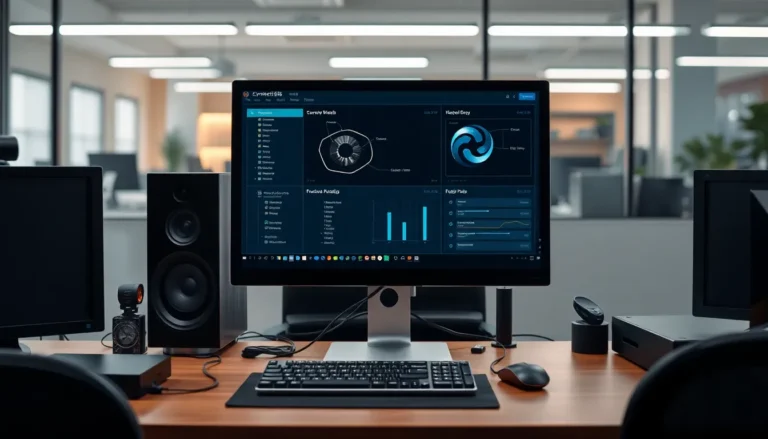Table of Contents
ToggleIn the tech world, the debate between DevOps and Site Reliability Engineering (SRE) often feels like a showdown between superheroes. On one side, you’ve got DevOps, the dynamic duo of development and operations, smashing silos and speeding up software delivery like it’s a race at the Indy 500. On the other, there’s SRE, the meticulous guardian of service reliability, armed with metrics and monitoring tools that would make any data nerd swoon.
Overview of DevOps and SRE
DevOps focuses on collaboration between development and operations teams to improve software delivery cycles. Its primary goal is to increase deployment frequency while reducing lead time for changes. Enhanced communication fosters faster problem-solving and encourages a culture of continuous improvement.
SRE emphasizes the importance of reliability in software systems. By leveraging metrics and monitoring tools, SRE teams identify potential issues before they impact users. SRE also applies software engineering principles to system administration, creating a proactive approach to operational challenges.
Both DevOps and SRE contribute to high-performing IT organizations. They aim to streamline workflows and enhance efficiency. While DevOps promotes a cultural shift, SRE establishes quantifiable objectives to maintain service reliability.
Automation represents a key aspect of both methodologies. DevOps teams rely on automation to facilitate deployment processes, ensuring consistency across environments. In contrast, SRE uses automation to handle operational tasks, allowing engineers to focus on more complex issues.
Metrics play a distinct role in each approach, too. DevOps measures success through deployment frequency and change failure rates. SRE prioritizes service-level objectives (SLOs) to maintain performance standards and uptime.
Addressing challenges effectively requires both approaches. Organizations implementing DevOps and SRE practices can expect improved collaboration and stability. By understanding the unique strengths of each, companies can tailor strategies to fit their needs, driving better outcomes in software delivery and reliability.
Key Principles of DevOps
DevOps emphasizes collaboration and communication between teams to enhance software delivery and operational efficiency. These principles drive innovation and efficiency across organizations.
Collaboration and Communication
Enhanced collaboration between development and operations teams is essential in DevOps. Breaking down traditional silos fosters a shared understanding of goals and challenges. Teams cultivate open channels that encourage feedback and problem-solving. Improved communication ensures that everyone aligns on project objectives and timelines. Frequent interactions can lead to quicker issue resolution and build a culture of trust. Promoting transparency within these teams transforms how they work together, making processes smoother and more efficient.
Continuous Integration and Delivery
DevOps relies on continuous integration and continuous delivery (CI/CD) practices to automate software delivery. Automated testing and integration streamline the development process while ensuring code quality. Releasing updates frequently reduces lead times for changes, which helps address user feedback promptly. With each integration, teams can identify and fix issues early, leading to faster deployment cycles. Continuous delivery enables organizations to maintain a competitive edge by responding swiftly to market demands. Implementing CI/CD practices significantly boosts overall productivity while minimizing risks associated with software deployment.
Key Principles of SRE
SRE prioritizes reliability and performance through structured approaches. Understanding its core principles enhances the effectiveness of service operations.
Service Level Objectives
Service Level Objectives (SLOs) define measurable goals for system reliability. They establish performance criteria such as availability, latency, and error rates. SLOs help teams set clear expectations regarding service performance. Maintenance of these objectives relies on regular assessments, ensuring compliance with set targets. For instance, a typical SLO might require 99.9% uptime for a specific service over a given period. Tracking SLOs allows teams to make informed decisions aimed at improving system reliability while balancing development needs.
Incident Management
Incident management addresses the identification, response, and resolution of service disruptions. SRE practices emphasize swift resolution to minimize user impact. The incident response process typically involves detection, assessment, and corrective action, ensuring a systematic approach. For example, implementing alerting systems facilitates early detection of potential issues. Effectively managing incidents improves overall service reliability and fosters a culture of learning. Post-incident reviews identify root causes and guide future improvements, refining operational processes. Continuous optimization minimizes recurrence of similar incidents, contributing to a more resilient system.
Comparing DevOps and SRE
DevOps and Site Reliability Engineering (SRE) share common goals in enhancing software development and operational efficiency. Both approaches prioritize automation and continuous improvement, facilitating efficient workflows. Collaboration lies at the heart of both methodologies, fostering communication between development and operations teams. They ultimately aim to deliver software with high quality and reliability.
Similarities and Overlaps
Collaboration serves as a fundamental element in both DevOps and SRE, promoting teamwork to achieve shared objectives. Each approach emphasizes the importance of automation in streamlining processes, managing workloads effectively. Continuous monitoring plays a crucial role, enabling teams to gain insights into system performance and address issues proactively. Metrics guide both methodologies, enhancing decision-making by offering data-driven perspectives. This shared focus on improving performance lends both approaches to complement each other, allowing organizations to achieve greater efficiency.
Key Differences
Distinctions between DevOps and SRE arise primarily in objectives and practices. DevOps emphasizes a cultural shift that aligns teams around faster software delivery, focusing on breaking down silos. In contrast, SRE centers on establishing reliability as a core principle. While DevOps employs continuous integration and delivery to boost deployment frequency, SRE utilizes Service Level Objectives (SLOs) to define and maintain performance standards. Incident management represents another key difference; SRE employs systematic processes for handling service disruptions, ensuring minimal impact on users. Understanding these differences allows organizations to choose the methodology that best fits their operational needs.
The Role of Automation
Automation plays a crucial role in both DevOps and SRE, enhancing efficiency and reliability in software delivery and system performance.
Tools and Technologies
A variety of tools streamline automation processes in DevOps, such as Jenkins for continuous integration, Docker for containerization, and Terraform for infrastructure as code. SRE teams utilize automation tools like Prometheus for monitoring, GitOps for deployment, and incident response solutions like PagerDuty. Each tool supports specific workflows, helping teams deploy quickly and respond to incidents effectively.
Benefits of Automation in Both
Automation significantly reduces manual tasks, minimizing the potential for human error. With automated testing, teams ensure code quality and expedite feedback loops. Faster deployment cycles improve responsiveness to user needs, enhancing overall service quality. Additionally, automation allows SRE teams to focus on complex issues, using machine learning algorithms for anomaly detection and proactive issue resolution. Ultimately, automation aligns with the core objectives of both methodologies: achieving high reliability and delivering software efficiently.
DevOps and SRE each play vital roles in modern software development and operations. While DevOps fosters collaboration and accelerates delivery cycles, SRE ensures that reliability remains a top priority. The choice between these methodologies ultimately depends on an organization’s specific needs and goals.
By understanding their unique strengths and approaches, teams can effectively leverage both to enhance productivity and service quality. Embracing the principles of DevOps alongside the reliability focus of SRE can lead to a more resilient and efficient operational environment. This combination empowers organizations to navigate the complexities of software delivery while maintaining high standards of performance and reliability.







